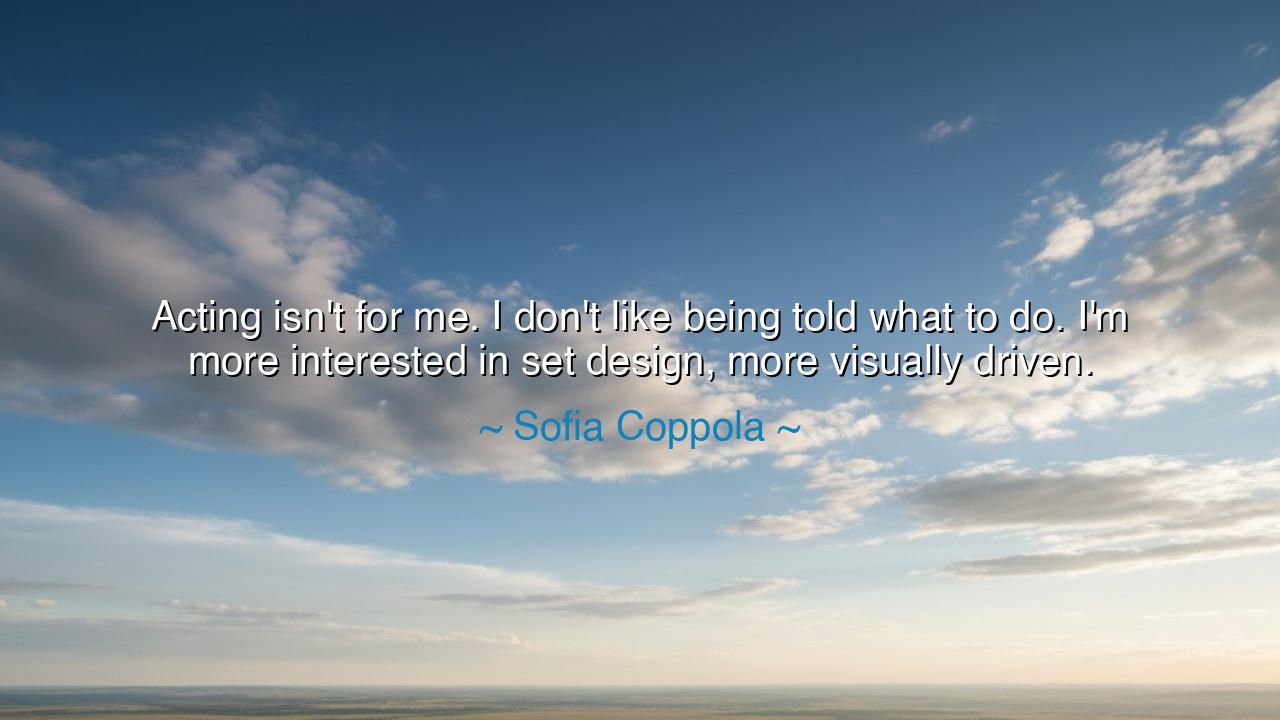
Acting isn't for me. I don't like being told what to do. I'm more
Acting isn't for me. I don't like being told what to do. I'm more interested in set design, more visually driven.






The words of Sofia Coppola—“Acting isn’t for me. I don’t like being told what to do. I’m more interested in set design, more visually driven”—speak with the quiet authority of one who has found her own way. They reveal a truth that every seeker must eventually face: that freedom lies in knowing one’s nature, and that fulfillment comes not from following the paths laid by others, but from walking the one that springs from within. In these few words, Coppola captures the essence of artistic independence—the courage to refuse imitation and the wisdom to honor one’s own instincts.
Born into the legendary Coppola family, Sofia’s destiny seemed written before her: to act, to stand before the camera as her father once commanded it. Yet she learned early that the role others imagine for you may not be your own. When she says, “Acting isn’t for me,” it is not rebellion born of pride, but revelation born of self-awareness. She recognizes that the stage of the actor is a place of performance, while her spirit belongs to the realm of vision. She would not be shaped by the will of others, nor confined to the scripts they wrote for her. Instead, she would shape worlds herself—creating atmospheres, spaces, and moods that speak in silence. In this, she embodies the timeless teaching: to be free, one must first refuse what is not true to oneself.
Her declaration, “I don’t like being told what to do,” may sound defiant, but beneath it lies the noble fire of creative sovereignty. Throughout history, the artist has stood at odds with authority—not from arrogance, but from devotion to truth. Michelangelo clashed with popes; Beethoven defied kings; Frida Kahlo painted pain that no gallery dared to name. Like them, Sofia’s refusal is not rebellion for its own sake—it is the refusal to live unawake. The obedient may find comfort in direction, but the visionary thrives in discovery. To those who are called to create, submission to another’s vision feels like the dimming of their own light. Sofia Coppola’s strength lies in her unwillingness to dim that flame.
When she says, “I’m more interested in set design, more visually driven,” she is describing not preference, but destiny. For her, story is not told through dialogue, but through light and space, through stillness and texture. In her films—Lost in Translation, Marie Antoinette, The Virgin Suicides—we see her philosophy embodied. The sets breathe like living souls; every object, every hue, every silence speaks more powerfully than words. She reminds us that vision itself is a language, and that beauty, when rendered with sincerity, communicates what speech cannot. The ancients would have called this mimesis—the divine act of shaping reality into art.
History offers countless echoes of her journey. Consider Leonardo da Vinci, who began as an apprentice painter but soon abandoned the constraints of his masters. He saw not only color but the mechanics of flight, not only faces but the mathematics of proportion. Like Coppola, Leonardo was driven by vision rather than obedience. His genius blossomed not in the roles others expected him to play, but in the freedom to explore what fascinated him most. So too does Coppola’s artistry thrive in the spaces where she decides the form, where the camera becomes her brush, and the frame her canvas.
There is a deeper wisdom here as well: to create authentically, one must align art with temperament. Sofia’s rejection of acting is not rejection of art—it is the embrace of her truer nature. The world often praises versatility, but the ancients taught that wisdom lies not in doing everything, but in knowing what is yours to do. The archer who tries to wield every weapon misses his mark; the musician who plays every instrument finds no melody of his own. Likewise, the one who learns to listen to their inner compass becomes master not of many paths, but of the right one.
Let this, then, be the teaching: know your own fire, and follow where it leads. Do not confuse expectation with destiny, or obedience with harmony. Some are born to act, others to build; some to speak, others to shape silence. Whatever your calling, let it spring from love, not approval. The world will try to tell you who to be, but the wise know that no art, no life, can flourish under borrowed will.
For in the end, Sofia Coppola’s words remind us that true creation is freedom—the freedom to say “no” when the world commands, and “yes” when the heart calls. She teaches that the artist’s duty is not to please, but to see; not to follow, but to form. And when you find your own way, as she did—when you choose the art that stirs your soul and reject what dulls it—you, too, will become both creator and creation, living as the ancients taught: not by imitation, but by the divine act of being wholly, fearlessly yourself.






AAdministratorAdministrator
Welcome, honored guests. Please leave a comment, we will respond soon